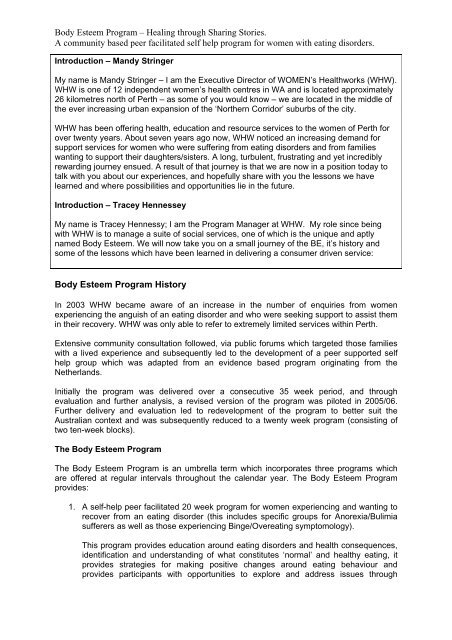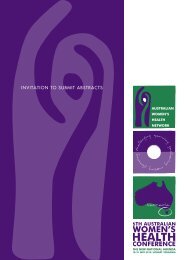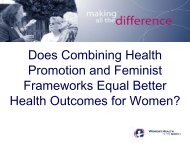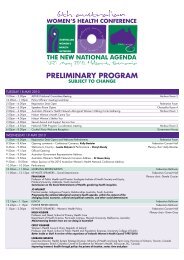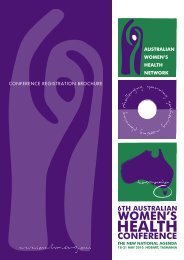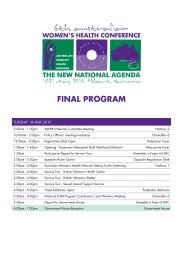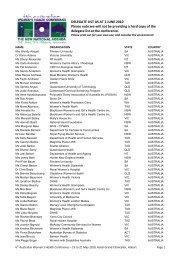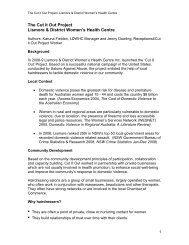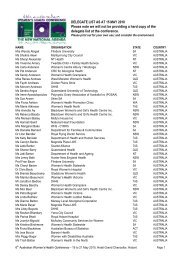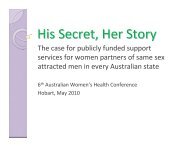Body Esteem Program - Australian Women's Health Conference ...
Body Esteem Program - Australian Women's Health Conference ...
Body Esteem Program - Australian Women's Health Conference ...
Create successful ePaper yourself
Turn your PDF publications into a flip-book with our unique Google optimized e-Paper software.
<strong>Body</strong> <strong>Esteem</strong> <strong>Program</strong> – Healing through Sharing Stories.<br />
A community based peer facilitated self help program for women with eating disorders.<br />
Introduction – Mandy Stringer<br />
My name is Mandy Stringer – I am the Executive Director of WOMEN’s <strong>Health</strong>works (WHW).<br />
WHW is one of 12 independent women’s health centres in WA and is located approximately<br />
26 kilometres north of Perth – as some of you would know – we are located in the middle of<br />
the ever increasing urban expansion of the ‘Northern Corridor’ suburbs of the city.<br />
WHW has been offering health, education and resource services to the women of Perth for<br />
over twenty years. About seven years ago now, WHW noticed an increasing demand for<br />
support services for women who were suffering from eating disorders and from families<br />
wanting to support their daughters/sisters. A long, turbulent, frustrating and yet incredibly<br />
rewarding journey ensued. A result of that journey is that we are now in a position today to<br />
talk with you about our experiences, and hopefully share with you the lessons we have<br />
learned and where possibilities and opportunities lie in the future.<br />
Introduction – Tracey Hennessey<br />
My name is Tracey Hennessy; I am the <strong>Program</strong> Manager at WHW. My role since being<br />
with WHW is to manage a suite of social services, one of which is the unique and aptly<br />
named <strong>Body</strong> <strong>Esteem</strong>. We will now take you on a small journey of the BE, it’s history and<br />
some of the lessons which have been learned in delivering a consumer driven service:<br />
<strong>Body</strong> <strong>Esteem</strong> <strong>Program</strong> History<br />
In 2003 WHW became aware of an increase in the number of enquiries from women<br />
experiencing the anguish of an eating disorder and who were seeking support to assist them<br />
in their recovery. WHW was only able to refer to extremely limited services within Perth.<br />
Extensive community consultation followed, via public forums which targeted those families<br />
with a lived experience and subsequently led to the development of a peer supported self<br />
help group which was adapted from an evidence based program originating from the<br />
Netherlands.<br />
Initially the program was delivered over a consecutive 35 week period, and through<br />
evaluation and further analysis, a revised version of the program was piloted in 2005/06.<br />
Further delivery and evaluation led to redevelopment of the program to better suit the<br />
<strong>Australian</strong> context and was subsequently reduced to a twenty week program (consisting of<br />
two ten-week blocks).<br />
The <strong>Body</strong> <strong>Esteem</strong> <strong>Program</strong><br />
The <strong>Body</strong> <strong>Esteem</strong> <strong>Program</strong> is an umbrella term which incorporates three programs which<br />
are offered at regular intervals throughout the calendar year. The <strong>Body</strong> <strong>Esteem</strong> <strong>Program</strong><br />
provides:<br />
1. A self-help peer facilitated 20 week program for women experiencing and wanting to<br />
recover from an eating disorder (this includes specific groups for Anorexia/Bulimia<br />
sufferers as well as those experiencing Binge/Overeating symptomology).<br />
This program provides education around eating disorders and health consequences,<br />
identification and understanding of what constitutes ‘normal’ and healthy eating, it<br />
provides strategies for making positive changes around eating behaviour and<br />
provides participants with opportunities to explore and address issues through
<strong>Body</strong> <strong>Esteem</strong> <strong>Program</strong> – Healing through Sharing Stories.<br />
A community based peer facilitated self help program for women with eating disorders.<br />
discussion and activities (issues such as self image, body image, loneliness,<br />
perfectionism, relationships, relapse, sexuality and decision making). Each group is<br />
facilitated by two women who have experienced and recovered from an eating<br />
disorder. The facilitators provide support and guidance based upon their own<br />
experiences.<br />
2. A support and information program for parents/partners and family members who<br />
have loved ones suffering from an eating disorder. This program provides education<br />
and insight into the experiences and difficulties experienced by sufferers, and are<br />
delivered over eight weekly sessions (of 90 minute duration). Key stakeholders and<br />
service providers across public and private mental health services in WA, who<br />
specialise in eating disorders provide presentations and allow opportunities for<br />
participants to ask questions and interact with each other in a supportive and<br />
developmental environment.<br />
3. A ‘Step-Down’ program for participants who have completed the peer facilitated self<br />
help program and are needing additional support to assist in the maintenance of<br />
recovery. This program is only available to those who have completed the initial<br />
program and are wanting/needing further support to assist them in refraining from<br />
returning to destructive and harmful thinking patterns and behaviours.<br />
The <strong>Body</strong> <strong>Esteem</strong> <strong>Program</strong> – A snapshot of the 20 week program<br />
• The emphasis of the BEP is upon women accepting responsibility (and credit!) for<br />
effecting positive change in their own lives. It is also about the sharing of support<br />
and guidance between women who are, and who have experienced similar<br />
difficulties.<br />
• Facilitators guide their groups through a series of themes, group activities and<br />
homework tasks.<br />
• Each group session runs for 2 and a half hours and has a regular structure: opening<br />
circle, theme discussion/evaluation of homework task; work time; closing circle.<br />
• Each group has a cut off of 15 participants. Experience has shown us that optimum<br />
numbers for group dynamics and retention sits at approximately 8 – 10 participants.<br />
• The group celebrates the end of the program by sharing a meal together at a local<br />
restaurant. This is a significant achievement for all members of the group and this<br />
event enables the participants to gain practical experience of engaging in an event<br />
which has previously been far too terrifying to contemplate.<br />
BEP – an integrated approach to best practice<br />
• The BEP promotes an environment of safety, respect and one that is free from any<br />
judgement. It provides an opportunity for role modeling and the visualisation that<br />
recovery can be achieved. Choices can be made that can lead to the retention of positive<br />
emotional health and wellbeing for the women it serves.<br />
• Results of the continual improvement processes gained from consumers, presenters,<br />
facilitators, key stakeholder agencies as well as administrative staff has ensured ongoing<br />
content review, policy development and program accessibility. Referral pathways are<br />
continually updated.<br />
• Continual liaison and negotiation with key stakeholders has meant that WOMEN’S<br />
<strong>Health</strong>works has established a fundamental place within eating disorder services in<br />
Western Australia, as well as at a national level.
<strong>Body</strong> <strong>Esteem</strong> <strong>Program</strong> – Healing through Sharing Stories.<br />
A community based peer facilitated self help program for women with eating disorders.<br />
• Early affiliations were initiated with (the now defunct) EDAWA (Eating Disorders WA)<br />
Since this time (2003) The BEP and WHW has developed key stakeholder relationships<br />
with:<br />
- Bridges Assoc Referencing Group and Bridges Management Committee,<br />
- The Butterfly Foundation<br />
- The Eating Disorders <strong>Australian</strong> National Network and the National Eating Disorders<br />
Collaboration Project<br />
- Eating Disorders Foundation Victoria Inc,<br />
- Princess Margaret Hospital Eating Disorders Clinic (WA),<br />
- The Centre for Clinical Interventions (Perth WA) and<br />
- Hollywood Clinic – a private hospital providing treatment services for eating disorder<br />
sufferers in Perth.<br />
- As well as a number of private GP’s and psychologists providing services to eating<br />
disorder sufferers and their families.<br />
Affiliations with current research initiatives ensures that all staff connected to the <strong>Body</strong><br />
<strong>Esteem</strong> <strong>Program</strong> are informed and kept abreast of contemporary trends and research.<br />
• Whilst the current strategic direction for mental health services in WA embraces<br />
consumer driven services and supports the involvement of consumers in determining<br />
their own recovery journey, WOMEN’S <strong>Health</strong>works has been at the forefront of putting<br />
this discourse into practice – the BEP can lay due claim to delivering services which are<br />
innovative and which embrace best practice of including consumers and responding to<br />
their needs, at every possible level of service delivery.<br />
• WOMEN’S <strong>Health</strong>works has responded to a need that has been identified in delivering<br />
the education and support group and has negotiated with Carers WA to work together to<br />
provide support for this client group within an environment that is conducive and<br />
supportive to the participants’ unique needs. This client group do not typically see<br />
themselves - or avail themselves of the services available for carers however, by<br />
establishing an MOU with Carers WA and by delivering the programs from the premises<br />
of this organisation, the participants are enabled to access services and resources which<br />
can greatly contribute to their own health and wellbeing.<br />
• Clinical supervision arrangements are provided through a MOU overseen by the<br />
Principle Clinical Psychologist at Princess Margret Hospital. This arrangement ensures<br />
that staff of the <strong>Body</strong> <strong>Esteem</strong> <strong>Program</strong> gains the direction and guidance needed to assist<br />
them in their roles and ensures that inter-service collaboration remains active, and that<br />
support for the facilitators is provided at a multi-agency level.<br />
• It has been imperative that the organisation implement strong facilitator and program<br />
guidelines, rigorous staff management strategies, contingency planning and the<br />
assurance of flexible supervision and de-briefing opportunities (for all staff involved in<br />
service delivery). The content of the program combined with the personal revelations of<br />
the participants, staff are continually exposed to ongoing threats to their own wellbeing<br />
which can lead to the possible ignition of triggers that can then incite relapse. WOMEN’S<br />
<strong>Health</strong>works has responded to these additional staff needs by putting intensive human<br />
resource management strategies into place and has actively embraced the development<br />
of policies and procedures which protects consumers, staff as well as the integrity of the<br />
organisation.
<strong>Body</strong> <strong>Esteem</strong> <strong>Program</strong> – Healing through Sharing Stories.<br />
A community based peer facilitated self help program for women with eating disorders.<br />
The unique attributes of our BEP Facilitators<br />
A unique attribute of the <strong>Body</strong> <strong>Esteem</strong> <strong>Program</strong> is the dual expertise that the facilitators of<br />
the program hold. Different to that of a peer led unstructured program, the <strong>Body</strong> <strong>Esteem</strong><br />
<strong>Program</strong> has evolved so that the facilitators hold professional qualifications (or work and<br />
facilitation experience) as well share the experience of having an eating disorder. This<br />
distinguished difference that sets this program apart is that it bridges the gap between<br />
professional pedagogical styled treatment programs and peer led groups which are formed<br />
through promoting mutual assistance whereby the participants have come together to satisfy<br />
a common need.<br />
The adaptations and continual review processes have established a West <strong>Australian</strong><br />
evidence base which is unique to mental health service provision and supports a model of<br />
facilitation that embraces both the lived experience and professional expertise. This model<br />
has not come about by chance. The implementation of the Netherlands program leaned<br />
towards the engagement of women who had the lived experience who could be then trained<br />
in the art of facilitation – the focus was not on professional skills and experience as being an<br />
equal and balanced factor in the recruitment and selection process. The impact therefore<br />
which was felt early on in the BEP journey was that a majority of the women who were<br />
accessing the service, were still vulnerable and not ready to take on a facilitator role,<br />
following the initial 20 week program.<br />
The Western <strong>Australian</strong> experience soon informed us that to ensure program guidelines<br />
were adhered to and that participants’ additional mental health needs could be supported<br />
and responded to in an appropriate manner, suitable staff who had a level of professional<br />
and or relevant work experience, be employed to meet this need. As a result it is now a<br />
requirement of the recruitment process to ensure that all facilitators working for the <strong>Body</strong><br />
<strong>Esteem</strong> <strong>Program</strong> bring with them a diverse range of experience, skills and knowledge<br />
around the specific mental health issue of eating disorders which is personal and<br />
professional, subjective yet balanced with objectivity.<br />
As alerted to earlier, the challenge here is that it is essential for the organisation to<br />
implement and activate strong policies for the training, guidance, supervision and support of<br />
staff. Every situation whereby the facilitator engages with a participant - holds within it, a<br />
possible trigger which could initiate relapse for the staff member. A strong duty of care and<br />
flexibility to meet individual needs is a quintessential requirement when supervising staff who<br />
each day, are exposing themselves to potentially very threatening situations.<br />
A five minute film clip of an interview we held with some of our facilitators about<br />
their own experiences of how they manage this issue themselves will be shown.<br />
Interview Questions:<br />
• Can you please describe why you were drawn to the role of facilitator with the BEP?<br />
• In facilitating a 20 week BEP program, how do you protect yourself from potential<br />
triggers?<br />
• How does the organisation support you in protecting yourself?<br />
• What is the best thing about facilitating for the BEP?<br />
• Why do you thing the lived experience is so powerful when working with women,<br />
wishing to overcome their eating disorders?<br />
Finally,
<strong>Body</strong> <strong>Esteem</strong> <strong>Program</strong> – Healing through Sharing Stories.<br />
A community based peer facilitated self help program for women with eating disorders.<br />
Let us now conclude by looking at the profiles and experiences of the participants<br />
themselves.<br />
With over eight 20 week programs now having been delivered, we can develop a profile of<br />
common characteristics and behaviours for those women entering the program.<br />
Participants come from across the Perth metropolitan area to attend the weekly program.<br />
The majority of participants tend to be employed, approximately half are studying and only a<br />
small minority is unemployed. All participants report that only the occasional family member<br />
is aware of the severity of their eating disorder and despite many hospitalisations – prior to<br />
attending the program - there are frequent reports by the participants about the isolating<br />
nature of eating disorders and how sufferers quickly develop the ability to hide and mask the<br />
intensity and malignity of the ailment. The average age of participants entering the<br />
Anorexia/Bulimia program is 28.7 years.<br />
Differing from the Anorexia group, the average age of participants in the Binge/overeating<br />
program is 37.8 years. Pre-selection interviews note that where participants have accessed<br />
professional services previously, the majority found that little help was forthcoming and that<br />
overwhelmingly, psychologists and counsellors did not take their condition seriously. Many<br />
participants entering this program take prescription medications for depression and/or<br />
anxiety related problems.<br />
Rather than give you dry data, let us now finish with a testimonial from a participant of the<br />
BEP who has gone on to be a facilitator with the program: let us hear Jemma’s story:<br />
A testimonial:<br />
My name is Jemma and I have now been a faciliator with the BEP for two years.<br />
I still don't really understand why - but 10 years ago when I was 15 - I developed an<br />
eating disorder.<br />
I wasn't unhappy at school, I wasn't unhappy at home, I didn't want to be like the<br />
women in fashion magazines, it was more that I was unhappy with myself, I thought this<br />
unhappiness would go away if I lost weight.<br />
For two years no one knew. I had a routine. I'd eat breakfast (I believed that I'd burn<br />
off these calories during the day so I was OK about eating breakfast). Besides a frozen<br />
fruit box, I wouldn't eat then until dinner - which I'd later vomit up, or "purge".<br />
I'd set myself weight loss targets but then when I'd achieved them, I'd decide it<br />
wasn't good enough and I'd set another target, and on it went until it was out of<br />
control.<br />
In Year 12, I told a friend and then a teacher about my eating disorder. I'm not sure<br />
why, I guess I felt very alone. On the other hand, I really didn't want anyone to know<br />
(although in retrospect maybe I did on some very subconscious level).<br />
Some time later after I began suffering dizzy spells at school and, as a result, my<br />
teacher told the school counsellor about the eating disorder, who in turn informed my<br />
parents.<br />
It was then that my life began to fall apart. I felt so ashamed and embarrassed, yet<br />
couldn't stop my behaviour. My mother was devastated and was always monitoring what<br />
I ate. We fought constantly and as a result I ended up moving out of home to live with<br />
my nanna. The fact that the eating disorder was out in the open only motivated me to
<strong>Body</strong> <strong>Esteem</strong> <strong>Program</strong> – Healing through Sharing Stories.<br />
A community based peer facilitated self help program for women with eating disorders.<br />
lose more weight and towards the end of Year 12 I had my first period of<br />
hospitalisation.<br />
Whilst I gained some weight in hospital, the program really didn't work for me. When I<br />
was discharged, I went well for a while but soon after fell back into old habits, as<br />
these were comfortable and familiar to me.<br />
I was very underweight when I was first hospitalised. When I returned to hospital for<br />
a second time about six months later I weighed 3 kilograms less than I did the first<br />
time I was admitted. After I was discharged from my second admission, instead of<br />
eating and purging after some meals I became anorexic; and avoided eating almost<br />
completely.<br />
Over subsequent years I was hospitalised a further three times and my weight went<br />
down as low as 10 kilograms below my first admission weight - however the target in my<br />
head had gone down another kilo.<br />
During my last two admissions I wasn't allowed to participate in group therapy sessions<br />
as they told me I had done them all before and had gained no benefit. Each stay was<br />
more and more boring and more demoralising. Due to my frustration, I continuously<br />
pushed the boundaries of the program.<br />
However in hospital I met a nurse. We spent a lot of time talking and she told me that<br />
she too had had an eating disorder. After I was discharged, she told me about the <strong>Body</strong><br />
<strong>Esteem</strong> pilot program which she was coordinating and asked if I'd like to join.<br />
I felt comfortable with her and decided I would give it a go, because I really had<br />
nothing to lose.<br />
The <strong>Body</strong> <strong>Esteem</strong> Project offered me a completely different perspective than hospital<br />
and the other efforts that I had either tried or that had been forced on me.<br />
My eating disorder had always been focused around weight and calorie counting.<br />
With <strong>Body</strong> <strong>Esteem</strong> for the first time I was genuinely able to take the focus away from<br />
‘weight" and consider a range of other issues surrounding body image, self esteem<br />
issues, insecurities, emotional problems and other things which were possibly linked<br />
with our eating disorders.<br />
In the <strong>Body</strong> <strong>Esteem</strong> Project, we looked at our broader life goals and how we would<br />
achieve these goals. I felt that it was possible to work towards these goals to regain<br />
some hope and happiness.<br />
The level of support from the facilitators - whom I found to be inspirational - and<br />
other participants also worked for me. With previous treatment methods, I found that<br />
once I was discharged from hospital, there was no support, thus increasing the chances<br />
of relapse.<br />
While participating in <strong>Body</strong> <strong>Esteem</strong> I was also supported by a friend who I'd met in<br />
hospital. She also wanted to overcome her eating disorder - in fact, she was the one<br />
who first suggested to me that we combine our efforts to overcome our eating<br />
disorders. Together we set short and long-term goals, we started to eat more<br />
appropriate amounts supported each other. I tried to stay away from the scales so I<br />
wouldn't know how much I weighed.<br />
Today thanks to my participation in the <strong>Body</strong> <strong>Esteem</strong> <strong>Program</strong> and the pact I made with<br />
my friend I have a lot of positives in my life:<br />
• I have a partner. We had our first child - a son in December 2007.
<strong>Body</strong> <strong>Esteem</strong> <strong>Program</strong> – Healing through Sharing Stories.<br />
A community based peer facilitated self help program for women with eating disorders.<br />
• My mum is really excited about being a grandmother and we have rebuilt the good<br />
relationship we once had.<br />
• I am now in my last year of a university course, majoring in Youth Work –<br />
There's still something there in the back of my head and I know I could become<br />
anorexic again BUT I also have many positive things in my life and would never want to<br />
do anything to risk my baby's happiness and so I'm confident I won't regress.<br />
What were the costs of those years?<br />
• Although I had many health problems along the way, some of them very serious, I<br />
don't think I have any permanent health problems.<br />
• My mother suffered a lot - she had a lot of health problems arising out of stress and<br />
for my first two hospitalisations we had no private insurance and so mum paid out<br />
around $350 a day for a period of around 6-8 weeks in total, so the financial cost was<br />
also very high.<br />
I know that there are those who think that people with an eating disorder are selfish<br />
and self-absorbed and should just get over it. It's not like that - it's completely the<br />
opposite, there is such a self loathing that sufferers want to fade away. Somewhere<br />
along the downhill spiral, they also lose touch with emotional reality.<br />
I found it soul destroying. At one stage everyone had given up on me. My psychiatrist<br />
told me she wouldn't see me anymore because I hadn't made any progress over a three<br />
year period. My mum was worn out. I had lost some very good friends and never went<br />
out - the only interests I had were for counting calories and exercising. I'd given up on<br />
myself. I'd lost everything.<br />
I didn't mean to reach this state, I wasn't happy about being there. But the support I<br />
had simply did not seem to work for me. I felt trapped and couldn't break free.<br />
It is terrific that the BEP exists, It's helped a lot of people, including giving me back<br />
hope and offering support that helped me move past the stage, most dangerous for<br />
regression, after being discharged from hospital for the fifth, and I'm pleased to say,<br />
final time.


